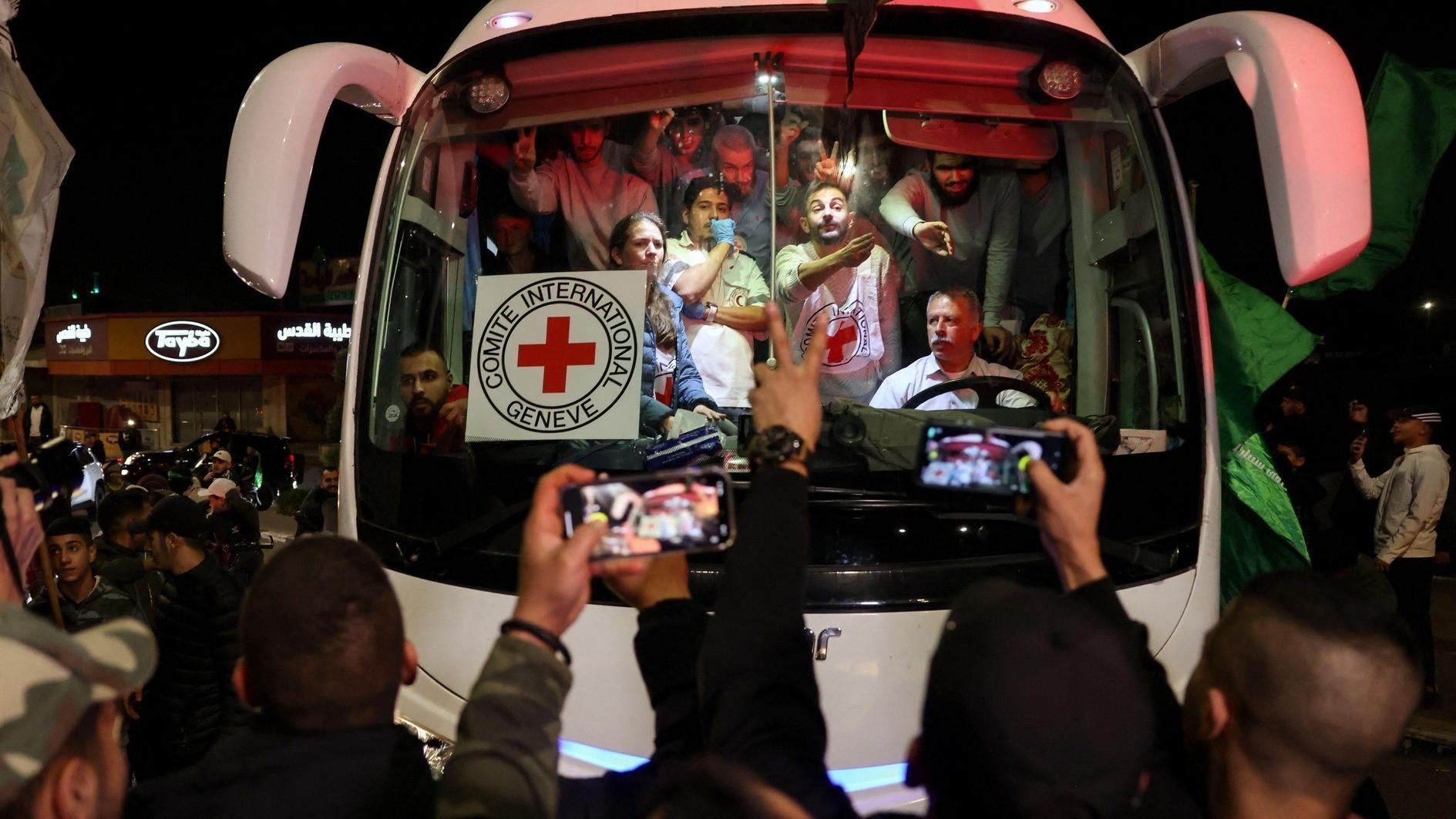Israel and Hamas complete 2nd day of swaps after tense delay, as Gaza cease-fire holds
GAZA STRIP

Hamas on Saturday released 17 hostages, including 13 Israelis, from captivity in the Gaza Strip, while Israel freed 39 Palestinian prisoners in the latest stage of a four-day cease-fire.
The late-night exchange was held up for several hours after Hamas accused Israel of violating the agreement. The delay underscored the fragility of the cease-fire, which has halted a war that has shocked and shaken Israel, caused widespread destruction across the Gaza Strip, and threatened to unleash wider fighting across the region.
The cease-fire, brokered by Qatar and the United States, is the first extended break in fighting since the war began. Overall, Hamas is to release at least 50 Israeli hostages, and Israel 150 Palestinian prisoners. All are women and minors.
Israel has said the truce can be extended by an extra day for every additional 10 hostages freed, but has vowed to quickly resume its offensive and complete its goals of returning all hostages and destroying Hamas’ military and governing capabilities.
The plight of the hostages has gripped the Israeli public's attention. Thousands of people gathered in central Tel Aviv on Saturday in solidarity with the hostages and their families. Many accuse Prime Minister Benjamin Netanyahu of not doing enough to bring the hostages home. The releases have triggered mixed emotions: happiness, coupled with angst over the scores of hostages who remain in captivity.
The office of Israeli Prime Minister Benjamin Netanyahu announced early Sunday that it had received a new list of hostages slated to be released later in the day in the third of four scheduled swaps.
In the West Bank, hundreds of people burst into wild celebrations for a second night as a busload of Palestinian prisoners arrived early Sunday. Teenage boys released in the deal were carried on the shoulders of well-wishers in the main square of the town of Al Bireh. But the mood of celebration was dampened by scenes of destruction and suffering in Gaza.
The start of the pause brought quiet for 2.3 million Palestinians in Gaza, who are reeling from relentless Israeli bombardment that has killed thousands, driven three-quarters of the population from their homes and leveled residential areas. Rocket fire from Gaza militants into Israel also went silent.
War-weary Palestinians in northern Gaza, where the offensive has been focused, returned to the streets, crunching over rubble between shattered buildings and at times digging through it with bare hands.
The United Nations said the pause enabled it to scale up the delivery of food, water, and medicine to the largest volume since the resumption of aid convoys on Oct. 21. It was also able to deliver 129,000 liters (about 35,000 gallons) of fuel — just over 10% of the daily pre-war volume — as well as cooking gas, a first since the war began.
The last-minute delay created a tense standoff on the second day of what’s meant to be a four-day cease-fire. By nightfall, when hostages had been expected to emerge from Gaza, Hamas alleged that aid deliveries permitted by Israel fell short of what was promised and that not enough was reaching hard-hit northern Gaza. Hamas also said not enough longtime prisoners were freed in the first swap on Friday.
But Egypt, Qatar and Hamas itself later said the obstacles had been overcome.
Shortly before midnight, Hamas released the hostages — 13 Israelis and four Thais. The Israelis were turned over to Egypt and then transferred to Israel, where they were taken to hospitals to be reunited with their families.
Hamas released a video showing the hostages appearing shaken but mostly in good physical condition as masked militants led them to Red Cross vehicles headed out of Gaza. Some of the hostages waved goodbye to the militants. One girl was on crutches and wore a cast on her left foot as she was escorted away.
The Israeli hostages included seven children and six women, Netanyahu’s office announced. Most were from Kibbutz Be’eri, a community Hamas militants ravaged during their Oct. 7 cross-border attack. The children ranged in age from 3 to 16, and the women ranged from 18 to 67.
It was a bittersweet moment for the residents of Be’eri, who have been living in a Dead Sea hotel since their community was overrun. A kibbutz spokesperson said all the released hostages either had a family member killed in the Oct. 7 rampage or had left a loved one in captivity in Gaza.
















